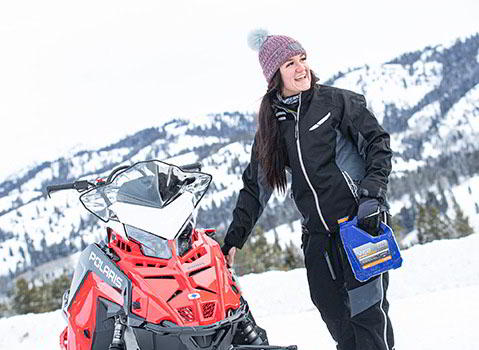
1. Remove Your Hood & Side Panels
To access your snowmobile's engine, clutch and other parts, you'll need to remove the side panel and hood. Turn the two fasteners a quarter-turn, remove the strap and set your side panels somewhere they won't get stepped on.

2. Reinstall Your Drive Belt
Your clutch service tool is located on the inside of your sled panel next to the clutch. Remove and insert the clutch tool to open up your clutch. Install your Polaris belt while rotating the driven clutch. Turn the driven clutch tool out while still rotating your driven clutch to ensure the belt is pulled into the sheaves properly. Rotate your driven clutch until the belt shows just over the top.
If your belt is showing significant wear, now is the time to replace it.

3. Reinstall Battery
If you've been using a BatteryMINDer® in the offseason to keep a full charge, it's time to reinstall it fully charged. Slide your battery back into the box. Carefully install the battery guard using the rubber clamp. Now you're ready to connect your cables. Remember to always hook up the positive cable first and use this opportunity to ensure your wiring is clean and correctly installed.

4. Clear Fogging Oil & Replace Spark Plugs
Before you can ride your snowmobile, you'll need to let it idle outside for 10-15 minutes to get the fogging oil burned off. Occasionally blip the throttle to raise RPMs. After your engine has completely cooled, remove your spark plugs and replace with brand new ones. Torque them to 22-foot pounds.

5. Drain, Recycle and Replace Fuel
If you filled your tank last season with 92 non-ethanol fuel and carbon clean, you can skip this step. If not, it's time to drain your tank, refuel and top it off with carbon clean. Follow the directions on your carbon clean bottle, which will tell you exactly how much to add.

6. Adjust Suspension and Adjust Track
When you put your sled to bed in the spring, you likely loosened your track to reduce tension and extend its life. While you prepare to align and tighten the track, take a good hard look at your hyfax, slider, and idler wheels for damage. Adjust and tighten your track following your owner's manual closely. If your track is in need of replacement, we recommend taking your snowmobile to a dealer for maintenance.

7. Inspect and Replace Damaged Carbides
Your carbides are essential for steering and sled stability. Check for regular wear and damage. For optimal performance, replace your carbides each year.

8. Top Off Engine Oil & Adjust Lubricants
What's out of sight is often out of mind. Which means even the most experienced riders forget to top off their engine oil once in a while. Refer to your snowmobile owner's manual and fill to the appropriate level. Depending on your storage situation, a snowmobile can accumulate dust, debris and moisture during the off-season. Clean and check all fittings, pivots and cables to ensure they are properly lubricated. Add and adjust lubricants as needed on the rear suspension, front suspension, steering components, as well as your chaincase.



